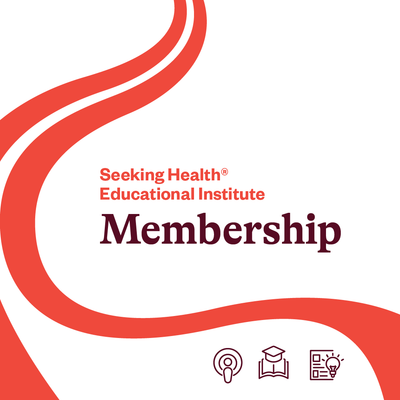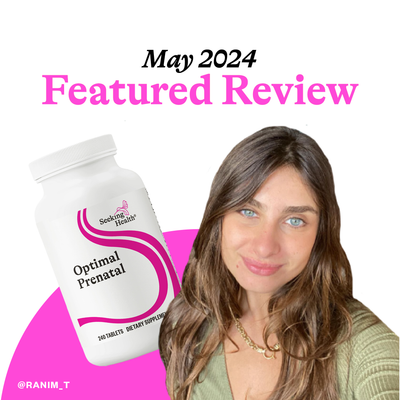TL;DR: Supporting your body’s detox pathways starts with minimizing daily exposure to harmful chemicals. Small changes can make a big difference from the food you eat to the air you breathe and the water you drink. Choose organic foods, improve indoor air quality, and filter your water to support your body’s ability to detox normally. Pay attention to personal care products, avoiding harmful ingredients that get absorbed through your skin. While your body naturally detoxifies, lowering exposure helps it function efficiently so you can continue feeling energized, clear-headed, and balanced.
Reducing Your Body Burden to Support Your Health

Let’s face it—modern life is full of environmental exposures that add to your body's chemical load. No matter how careful you are, chemicals from food, air, water, and household items sneak in. If your body isn’t efficiently clearing them out—especially if you have genetic variations like MTHFR—this buildup can make you feel sluggish, overwhelmed, and unwell.
While detoxifying your body is important, the first step should be reducing your chemical exposure. Think of it like cleaning a house: if dirt keeps getting tracked in, you’ll never keep it clean. You can support healthy detox pathways by making smart choices in your daily routine.
What Is Body Burden?
Your body burden is the total amount of chemicals—both natural and man-made—present in your system at any given time. This level fluctuates based on two key factors:
- Exposure: Some days, you come into contact with more pollutants than others.
- Elimination: Some days, your body clears more waste than others.
Since you can’t always control elimination, reducing exposure is your best strategy to support your body’s ability to eliminate chemicals.
Minimizing Chemicals in Your Food

What you eat plays a huge role in your body burden. Every bite either helps or hinders your body’s ability to function optimally. Here’s what to watch for:
- Choose organic when possible to avoid pesticides, herbicides, and synthetic additives.
- Beware of arsenic in rice-based products like rice milk, rice cakes, and rice crackers.1 If you eat rice, rinse it thoroughly and opt for varieties lower in arsenic.
- Avoid processed and fast foods, which often contain preservatives, additives, and unhealthy fats.
- Be mindful of allergens and intolerances that stress your body.
- Cook with care. High-heat cooking, especially with gas stoves, can produce harmful compounds. Opt for steaming, baking, or using an electric stove.
- Watch out for GMOs and glyphosate exposure. Many conventional crops are treated with Roundup (glyphosate), which has been linked to various health concerns.2
- Eat fresh and nutrient-dense foods to support your body’s natural detox pathways.
If you’re looking for an excellent resource on food and metabolism, check out The Metabolic Makeover: It’s All About Energy. It breaks down how nutrition impacts your biochemistry and energy levels.
Supporting Good Indoor Air Quality

Indoor air is often more polluted than outdoor air. Since you spend most of your time indoors—whether at home, work, or commuting—cleaning up your air is crucial. Here’s how:
- Ditch synthetic air fresheners. These don’t purify the air—they load it with chemicals.3
- Avoid scented dryer sheets, candles, and perfumes that release volatile organic compounds (VOCs).
- Use a high-quality HEPA air filter to remove airborne pollutants.
- Ventilate your home often. Open windows when the outdoor air is clean to let fresh air circulate.
- Watch out for mold and off-gassing furniture. New furniture, carpets, and mattresses can release harmful chemicals. Air them out before bringing them inside.
- Consider your home's location. Living near highways, factories, or airports increases exposure to pollutants.
- If you cook with gas, ensure your kitchen is well-ventilated, or switch to electric cooking methods.
Drinking and Bathing in Clean Water – Your Health Depends on It

Access to clean water is a fundamental but often overlooked aspect of maintaining your health and well-being.
Unfortunately, most tap water contains harmful chemicals and contaminants that can affect your body in subtle but significant ways.4 It's time to rethink the water you drink and bathe in—because your health is worth it.
Why Filter Your Water?
Many public water supplies contain substances like chlorine, chloramine, chloroform, pesticides, pharmaceuticals, and even xenoestrogens. These chemicals can disrupt your hormonal balance, increase the risk of infertility, and contribute to cardiovascular and other sinister issues.5
Filtered water plays a vital role in protecting your body’s natural defenses.
Did you know that your body’s key antioxidant, glutathione, helps neutralize these harmful substances? When you drink unfiltered water, your body works overtime to detoxify, which can deplete glutathione levels over time and increase cellular damage. You have the power to reduce this stress by filtering your water.
Steps to Safer, Cleaner Drinking Water
Here’s how you can ensure you and your family always drink the safest, healthiest water possible:
Always Choose Filtered or Spring Water
Filtered water and natural spring water are great options for staying hydrated without worrying about harmful chemicals. Avoid drinking unfiltered tap water—if it hasn't been filtered, then YOU are the filter.
Pick the Right Water Filter
- Activated Carbon Filters: Ideal for removing chlorine and improving taste. They preserve essential minerals like calcium and magnesium but are not efficient in removing harmful contaminants such as heavy metals.
- Reverse Osmosis (RO) Systems: Highly efficient at removing almost all contaminants, including heavy metals, pesticides, and chlorine. However, they also strip water of essential minerals—so invest in a remineralizing filter or add minerals back into your diet with supplements to maintain balance.†
Avoid Distilled Water for Long-Term Use
While distilled water is free of contaminants, it also lacks crucial minerals. Consuming it over time is harmful and leads to nutritional deficiencies.
Avoid Bottled Water
Whenever you can, opt for spring water that comes in glass bottles. Even BPA-free plastic bottles often leach harmful chemicals into your water. Whenever possible, stick with filtered water in reusable, environmentally friendly containers.
Why Clean Bathwater Matters, Too
It’s not just what you drink—how you bathe matters too.
Your skin is your largest organ, and it readily absorbs chemicals in water. Showering in chlorinated water can irritate your skin, dry out your hair, and potentially contribute to respiratory issues due to inhaling chemical vapors. Equip your home with a high-quality shower filter to support the health of your skin and lungs.
Reducing Chemical Exposure in Personal Care Products

Your skin absorbs what you put on it. Many beauty and hygiene products contain harmful chemicals that add to your body burden. Check the ingredients in:
- Shampoo and conditioner
- Lotions and moisturizers
- Deodorants
- Makeup
- Toothpaste
To find cleaner options, use the EWG’s Skin Deep Database, which rates personal care products based on their safety.
Seeking Health™’s Detoxification Supplements
Support your body’s detoxification pathways so they stay healthy and continue working efficiently. Our Detoxification Supplements have been carefully formulated with scientifically-backed ingredients so your body gets nothing but the best. You can trust our products to be safe and effective so you can continue feeling healthy for years to come!†

Liposomal Glutathione is a superior support formula with antioxidant properties. Each serving provides 100 mg of reduced glutathione packaged in soy-free liposomes to enhance absorption and delivery. Liposomal Glutathione is formulated by epigenetics expert Dr. Ben Lynch. It is ideal for those seeking an effective way to supplement glutathione.†

Liver Nutrients is an all-in-one liver support dietary supplement. This synergistic blend of nutrients and herbs supports the healthy metabolism of chemicals and hormones in the liver. This formula also promotes normal glutathione production and liver cell regeneration.†

Liposomal Vitamin C Plus is ideal for those seeking an effective and well-tolerated vitamin C supplement. It includes bioflavonoids from rose hips, quercetin, and hesperidin for additional antioxidant-like support. These plant bioflavonoids also enhance the action of vitamin C.†

DIM + I3C is a targeted formula that supports healthy estrogen metabolism and a healthy oxidative stress response associated with xenoestrogen exposure. DIM (diindolylmethane) is a byproduct of I3C (indole-3-carbinol), a compound found in broccoli, cabbage, and cruciferous vegetables. Both DIM and I3C are dietary indoles that support the normal processing of estrogen metabolites.†
The Bottom Line

Supporting your body’s detox abilities starts with small, intentional steps to minimize exposure.
Have you considered how your everyday choices impact your health, from the food you eat to the air you breathe and the water you drink? Simple shifts, like choosing organic foods, improving indoor air quality, and filtering your water, help support your body’s detox pathways.
Don’t forget your skin, a major gateway for absorption—is your personal care routine free of harmful ingredients? While your body is naturally equipped to detoxify every day, lowering your chemical exposure allows it to work more efficiently, so you can continue feeling energized, mentally clear, and balanced.
What small changes can you start making today to support your body’s incredible ability to heal and thrive?

References:
- https://pmc.ncbi.nlm.nih.gov/articles/PMC4176478/pdf/pone.0108098.pdf
- https://pubmed.ncbi.nlm.nih.gov/32897110/
- https://portal.ct.gov/-/media/Departments-and-Agencies/DPH/dph/environmental_health/eoha/pdf/AirFreshenerFSpdf.pdf
- https://pubmed.ncbi.nlm.nih.gov/32178293/
- https://pubmed.ncbi.nlm.nih.gov/12594192/
†These statements have not been evaluated by the Food and Drug Administration (FDA). This product is not intended to diagnose, treat, cure, or prevent any disease.












